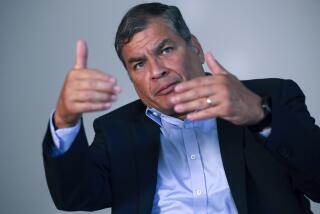President Is Selected as Ecuador Ends Crisis
- Share via
QUITO, Ecuador — Vice President Rosalia Arteaga became interim president of Ecuador under a compromise reached Sunday to end a political crisis that saw three people claiming the right to lead this Andean nation.
Under a formula worked out with Congress and the military, Arteaga will lead the nation for about a week while constitutional reforms are passed to clarify presidential succession. Her successor will serve until new presidential elections are held and the winner begins a four-year term Aug. 10, 1998.
Congressional leader Fabian Alarcon, who had claimed the presidency along with Arteaga and elected President Abdala Bucaram, is widely expected to succeed Arteaga after the constitutional reforms are passed.
The compromise not only solves the immediate crisis but also signals a new relationship between politicians and Ecuador’s powerful military. The armed forces, which turned over the country’s rule to civilians in 1979, resisted repeated calls that they take control. Instead, the Joint Chiefs of Staff acted as arbiters among the competing civilian authorities.
“The armed forces have played an important role because they have respected the constitution,” Arteaga said in her first presidential news conference.
Earlier in the day, Arteaga accepted the interim presidency during a brief ceremony in the Yellow Salon of the national palace under the portraits of her predecessors.
“The nation has found a constitutional solution that permits us to reconstruct the dialogue and the hope for a new country,” said Ecuador’s first female president, a former schoolteacher. She later waved from the balcony at crowds who serenaded their new president with “La Chola Cuencana,” or “The Girl From Cuenca,” a song referring to her hometown in southern Ecuador.
“The armed forces have given the politicians a historic lesson,” she said during her brief acceptance speech, praising the military’s role in resolving the crisis that began Wednesday.
On that day, thousands of people took to the streets of Quito, the capital, demanding the ouster of Bucaram, whose increasingly eccentric behavior and economic austerity program had infuriated them.
Congress responded Thursday by declaring Bucaram mentally incompetent and choosing Alarcon, the president of the Congress, to replace him. Arteaga immediately claimed the presidency for herself.
Military leaders worked first behind the scenes and, in the end, openly to resolve the crisis.
When Alarcon led a march on the national palace to forcibly oust Bucaram on Friday, police turned back the demonstrators blocks short of the palace, and one marcher was killed by a tear-gas canister.
However, military leaders also apparently counseled Bucaram to leave Quito to defuse tensions. He went home to the port city of Guayaquil, about 175 miles southwest of Quito.
On Saturday, the Joint Chiefs met with Arteaga and formally withdrew support from Bucaram.
The armed forces then interrupted a special session of Congress to call legislative leaders to the Defense Ministry late Saturday for consultations. When the politicians returned to Congress, they approved the compromise that named Arteaga interim president.
Arteaga, 40, entered politics through her work in government cultural foundations. She was education minister before being elected vice president last year.
During a news conference early Sunday in Guayaquil, Bucaram acknowledged that he had been ousted, although he still claimed that he is the rightful president. In an earlier television interview, he vowed to make a comeback, saying: “I’m going to be a candidate for the presidency in the next elections.”
Several legislators called on the armed forces to prevent Bucaram from leaving the country while investigations are conducted into allegations of massive corruption in his six-month administration.
Analysts said that the alleged corruption, combined with Bucaram’s eccentric behavior and his economic austerity program, led Congress to force him from office.
Bucaram won the presidency promising that he would make the rich women of Guayaquil learn to iron and cook because, under his administration, there would be no poor people left to wait on them. Instead, he more than doubled the price of many public services, ending government subsidies in a classic austerity program designed to stabilize the heavily indebted economy.
His occasionally odd behavior--naming himself president of a popular soccer team and promoting his own compact disc of rock music by singing off key surrounded by scantily clad dancing girls--at first delighted Ecuadoreans but soon wore thin. He offended both the armed forces and civilians by apologizing to Peru for a 1995 border war.
Arteaga and Alarcon publicly opposed his economic measures.
“When I heard Abdala Bucaram’s inauguration speech, I heard a speech about closing the gap between rich and poor,” Arteaga said. “I think I have the right, like all Ecuadoreans, to differ and to become disillusioned.”
More to Read
Sign up for Essential California
The most important California stories and recommendations in your inbox every morning.
You may occasionally receive promotional content from the Los Angeles Times.













